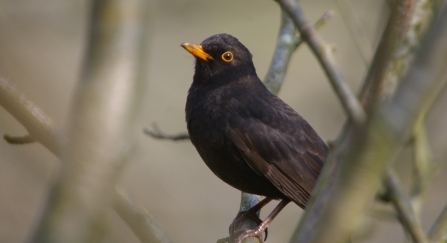
Image by: Neil Aldridge

Image by: Neil Aldridge
The sound of spring for me is a highlight of the year, not just the season. Waking up very early, I enjoy hearing one by one my feathered friends tweeting outside the open window before they come together to play their first song.
Whilst the robins, thrushes, tits, finches and woodpigeons are all a pleasure to hear cooing and twittering away, it’s the well-known blackbird and its flute like tones and leading solo performance that takes my centre stage. Greeting me when I wake, when I leave the house and return. They almost feel like family members - I even serve their breakfast before I do my own. I can’t help but feel responsible for their health and wellbeing, especially as they do so much for mine.
This time of year, it’s also a joy (and relief) to welcome the return of migrating birds, many who have returned from Africa to spend their summer days with us. The forked tail of the swallow is another signal of the brighter days ahead, as are the black anchors in the sky from our acrobatic swifts, and our agile tiny fliers the sand martins who skim over our waters - whilst they all line up along telephone wires.
Spring is the time I feel most content and connected with nature. Yet, as the number of birds dwindle - we have lost around half of the UK's songbirds since the 1970s and over 44 million birds since 1966 - I do worry whether one day this connection will be lost. If we keep changing their natural environment to an unnatural one, how many more birds will we lose? How will we explain to the next generation what has happened to our birds, if the dawn chorus keeps getting quieter until there is no song?
As farmland accounts for over 70% of the UK's land, it’s no surprise that what happens on that land has had a big impact on our songbirds. Yet, it’s not just the changes to agricultural practices - the loss of mixed farming, hay meadows and hedgerows and increase in pesticides and fertilisers – that they now face. Climate change, invasive species, persecution and habitat loss are just a few other culprits.
Over the bank holiday it was not just the dawn chorus setting off the alarm bells for me. Hitting the headlines was the alarming new UN report which warns us that ‘one million species are at risk of extinction’ - the wake-up call we all need to spring us into action. It’s not just our beloved birds we are losing because of our actions but nature everywhere.
Whether you woke up to celebrate the joy of the dawn chorus on Sunday or not, please remember not just the rise of their song and all it does for our happiness but also the fall in their numbers. To protect them now goes far beyond filling up bird feeders, although that’s a good start. To let nature sing, we must not fall silent. Now is the time to use the power of our voices to secure a wilder future as without them our future is a much quieter and less inspiring place.